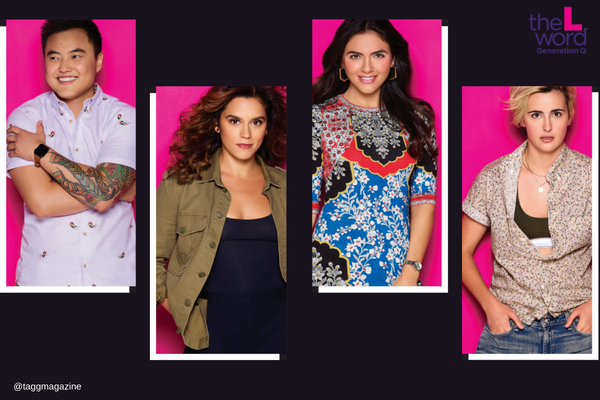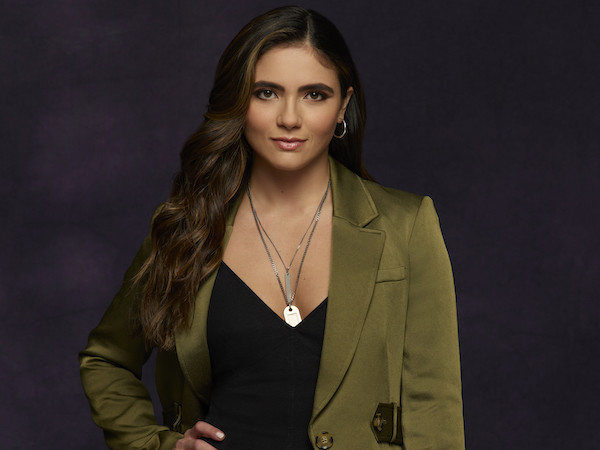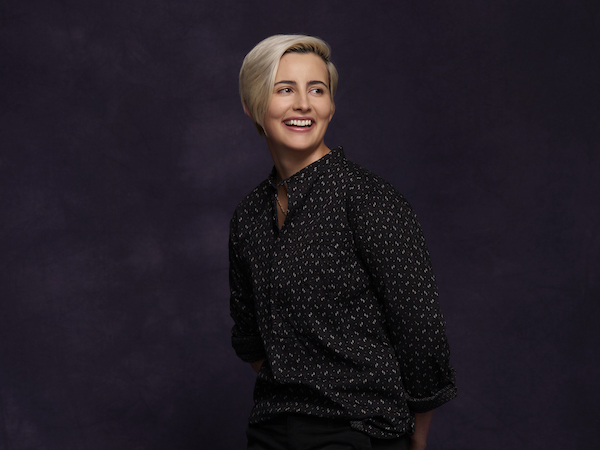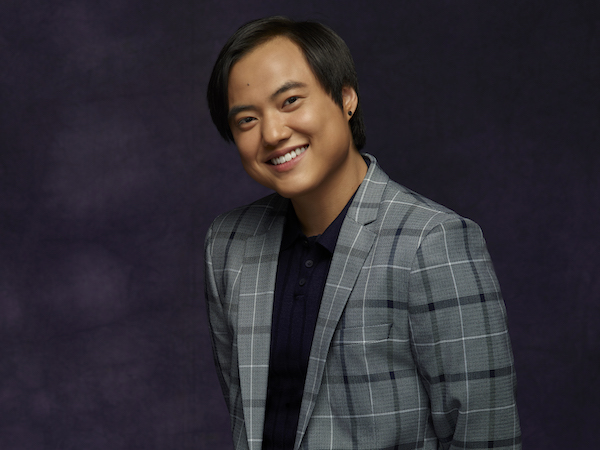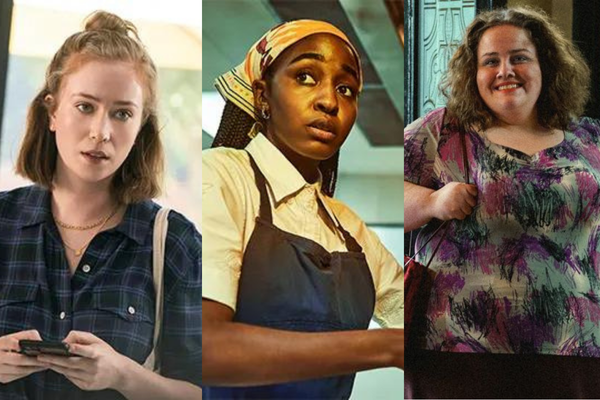
Tegan and Sara Dish On Their New TV Show, Album, Tour, and Book
November 16, 2022
The L Word Generation Q Roundup: Season 3, Episode 1
November 18, 2022It’s been three years since the reboot of The L Word premiered on Showtime, and the excitement for the show remains at an all-time high, especially after last season’s cliffhanger between fan favorites Bette (Jennifer Beals) and Tina (Laurel Holloman). On November 18, season three of The L Word: Generation Q returns and promises more drama than ever before. For this special Gen Q issue, Tagg Magazine sat down with four of the show’s cast members to talk about what to expect from this season and the importance of diverse queer representation. Here’s what Sepideh Moafi (Gigi), Arienne Mandi (Dani), Leo Sheng (Micah), and Jacqueline Toboni (Finley) had to say.
ARIENNE MANDI
When the trailer dropped for season three of The L Word: Generation Q, fans of Dani (Arienne Mandi) and Gigi (Sepideh Moafi) or “Gini” noticed two bombshells: Dani asks Gigi about moving in together, and there is an image of Dani kissing Finley. On what that means for Dani this season, Mandi is reticent to say.
“I think Dani is just trying to find her person,” says Mandi. “Like everyone else, who is the person we end up with? How do we face those challenges with those people and develop into something stable and mature and forever? I think for Dani there are some twists and turns.”
On where those twists and turns may lead, we can’t be sure, though when discussing her favorite part of being on Generation Q, Mandi mentions getting the chance to act alongside different cast members, but doesn’t disclose whether that will continue this season.
“I’m so grateful for any opportunity I have to work with anyone that is new,” says Mandi. During season one, it was primarily myself, Sophie, and Bette. And then season two, it was something else. So any opportunity I get to cycle through and work with new people is exciting.”
Even if Dani doesn’t end up with Gigi, Mandi is proud of the impact of Gini’s relationship. “There is not specifically any content of queer Iranian women anywhere, and considering what is happening right now with the female-led revolution in Iran, I think these voices are more important than ever,” says Mandi.
Since Dani and Gigi got together, Mandi has heard a lot of positive reactions from the fans, including people from Iran who have said that seeing two queer Iranian women together was “groundbreaking.” But Mandi acknowledges that there is still work to do.
“There is not enough representation of Iranian queer couples, and I wish there were more that included a family dynamic because anything surrounding that is a bit taboo,” says Mandi. “We typically see a coming out story or someone not being accepted by their family, but we need more positive and nuanced stories that don’t necessarily involve people being pushed out of their homes.”
Mandi is particularly excited about the diverse stories the show will tell this season, and is grateful for the original series, even if it wasn’t always as inclusive.
“The original show paved the way for something like this to be possible. Without the original show, we wouldn’t have this moment in time now where we could have two queer Iranian women together on television,” says Mandi.
Yet there are some aspects of the original series that the writers have replicated this season, which Mandi is thrilled about.
“For me, this season is just a little closer to the original show because it’s got a little more levity and a little more fun,” says Mandi. “It’s a little messy. It’s exactly the show we wanted to make. All of us on set imagine the moments where the crowd will start squealing and screaming.”
JACQUELINE TOBONI
When Gen Q premiered with a new generation of characters to fall in [the way that we live and] love with, Finley was a lead contender for many of our hearts. She won over scores of fans and Jacqueline Toboni says they’ll be happy with season three.
“This season feels gayer and it feels for the fans,” Toboni tells Tagg. “It feels like it’s the season the fans deserve.”
We’ll continue to see Finley’s journey with her recovery from addiction, which Toboni says is important to explore on a queer show. “Playing a character in recovery I think has been really special,” Toboni says. “Addiction really plagues our community because there is a lot of trauma […] especially coming from a past like Finley has. It’s been really nice to do these three seasons because there’s such an arc. I think she kind of grows up and gets what she deserves.”
When Toboni was growing up, she was sneaking episodes of the original L Word series like the rest of us. “I watched them totally alone,” she remembers. “I was like 13 years old.”
Thirteen-year-old Toboni was clueless about why she wanted to watch The L Word. She loved Shane the most— Alice and Dana, too—but she had no idea she was queer: “It was more obvious to other people. I was for sure the last to know.”
She remembers in the sixth grade she wrote an autobiography for school where the last chapter was about her future. The dream life that she wrote down was that she’d have a husband and five kids… “and an illustrious career with the Sparks in the WNBA. And then after that, after my jersey was retired, I was going to work my way through the fire department and become fire chief of San Francisco.”
It took a long time for her to realize just how gay she was, even with clues like that. Another girl gifted her a box set of season one of The L Word DVDs, sensing her vibe. “Little did she know I already had a Showtime subscription and I was watching,” Toboni says.
Now the actors on those DVDs are her friends. While she was a bit starstruck at first, now they’re just “Leisha and Kate.” During the first seasons the actors were isolated to interacting only with who they had scenes with due to COVID-19 restrictions, but now they’re able to bond more freely, including playing pickleball outside of filming.
While she her dream is starring in a lesbian romcom some day, Toboni is thrilled to be exactly where she’s at for now. “Being able to be on set every day with queer people that are of all different ages and have totally different lives from each other, I’m so grateful that I get to have that.”
SEPIDEH MOAFI
One of the first times we meet Gigi Ghorbani (Sepideh Moafi) on The L Word: Generation Q, she is screaming at her ex-wife Nat and hammering a nail into Nat’s wall with her wedding ring on it. Though it’s not one of the most likeable starts, over the course of the last two seasons, Gigi has become a fan favorite and has made a huge impact on representation in media as a queer Iranian character.
During its initial run, The L Word was not known for being particularly diverse on multiple levels. Though there were a few women of color on the show, the majority of the cast was white, feminine, cisgender, and well-off. That said, when Moafi first saw the show about a decade or so ago, she still found it very impactful.
“The L Word was definitely a very radical and important show for me and for most of my friends,” says Moafi. “Having an ensemble of queer women who are successfully just living their lives confidently and unapologetically was – and still is in this day in age – something really important and radical.”
Yet Moafi acknowledges that the first iteration of the show was lacking a diverse cast, “not just in terms of race or ethnic background, but the characters’ backgrounds – where they come from and who they are.” That lack of representation is part of why Moafi was so excited to get involved with Generation Q.
“It’s not just having the Iranian woman on screen, but it’s how Gigi is living her life. She’s not apologizing for who she is,” says Moafi. “Her shame is not governing her actions or her relationship. She is fully confident and fully flawed, and owns all of it.”
Given the current women-led uprising in Iran, portraying a queer Iranian woman is particularly important to Moafi. Two months ago, a 22-year-old Kurdish Iranian woman named Mahsa Amini was arrested by Iran’s “morality police” and died in their custody. Since her death, there have been nationwide protests in more than 120 cities, and Moafi has used her platform to call attention to the protests and Iran’s treatment of LGBTQ+ people.
“In the South West Asian and North African region, being gay is something that is stigmatized, and in Iran alone, you can be executed for being gay,” says Moafi. “There is a rich, beautiful queer community in Iran, but everything has to happen behind closed doors.”
That is part of why it’s been such a privilege for Moafi to play a queer Iranian character on Generation Q, especially one that is dating another character of Iranian descent.
On whether or not that romance will continue, Moafi is tight-lipped. “Shit gets crazy this season for every single character and storyline.” says Moafi. “Certain life events happen that bring all of the characters into moments of existential crisis. It’s massive upheaval.”
No matter what happens with Gigi’s dating life, Moafi has made a significant impact on queer women across the world.
LEO SHENG
Leo Sheng (Micah Lee) first stumbled across the original L Word series on YouTube around the age of twelve. “I came out [as a trans man] a little bit after my introduction to Max,” referring to Max Sweeney (Daniel Sea), the trans man character on the original L Word show. Sheng had never met a trans man in real life and seeing Max made him realize that being trans even existed, a key to his own self-realization.
Sweeney’s character was problematic representation in multiple ways, but Sheng believes it was a significant part of trans media history even if it wasn’t always done in the best way. “For all of the ways that we would maybe do it differently now, I also do think that like it did bring the storyline to a level of consciousness that maybe in the mainstream media wasn’t being seen before,” he tells Tagg. “I am appreciative of Max’s presence, because it allowed me to see this was a possibility in the world.”
But even though Sheng believes Max was important in many ways and wants to honor that history while playing the only trans man on Generation Q, he wants Micah to stand alone as his own character without only being compared to Max.
“I want to be so respectful of the effort that went into the portrayal of Max in the original and I don’t want people to see [Micah] as a ‘do-over,’” Sheng says. “I want this to be seen as a new opportunity to tell a story in a way that it wasn’t told before.”
That story includes exciting new storylines for Micah in season three. “I think season three is bigger and bolder than I think we’ve ever been,” Sheng shares. “We really get to dig so much deeper into these characters that we’ve only gotten to know a little bit these last couple seasons.”
A major step for Micah in season three will be exploring the possibility of parenthood with Maribel (Jillian Mercado). It’s a theme rarely explored for trans characters on TV and will be the first time a couple on Gen Q goes through the queer family planning process. Whether Micah and Maribel end up choosing to go forward—and if they do, how—is yet to be revealed to fans as we await the season to air.


